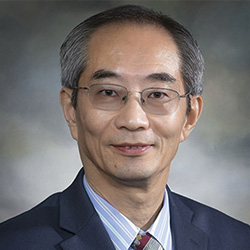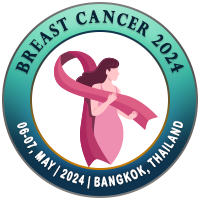
Dr. LuZhe Sun
University of Texas Health Science Center, USATitle: MTOR pathway in aging mammary stem cells and early-stage breast cancer progression
Abstract
We found that aging mouse mammary stem cells (MaSCs) form mammary ducts with higher frequency of early neoplastic lesions than those formed by young MaSCs. Aging mouse mammary glands also show increased gene signatures of inflammation and immune responses, and enriched MTORC1 signalling activity in our investigation involving various molecular, cellular, in vivo, and bioinformatics approaches including single cell transcriptomic studies. Treatment of mouse models of mammary tumors with an MTORC1 inhibitor everolimus significantly reduced tumor incidence and the frequency of invasive mammary tumors. We recently investigated whether targeting mTORC1 pathway is effective in abrogating mammary stem cell (MaSC) function and early-stage invasive breast cancer progression markers. A short-term treatment of women with Stage 0 breast tumors with a low dose of sirolimus in a phase II clinical study significantly abrogated mammary stem cell activity, particularly in postmenopausal patients. It did not affect the frequency of luminal progenitors but decreased their self-renewal capacity. The treatment also significantly diminished prognostic biomarkers associated with mammary gland inflammation and breast cancer progression from ductal carcinoma in situ to invasive breast cancer. Overall, these findings indicate a link from MTOR signalling to mammary stem and progenitor cell activity and cancer progression. MTOR inhibitors may have potential for prevention of invasive breast cancer.
Biography
Dr. LuZhe Sun received his Ph.D.
degree in Physiology from Rutgers-The State University of New Jersey and
UMDNJ-Robert Wood Johnson Medical School in 1990 and obtained his postdoctoral
training in Cancer Biology in Baylor College of Medicine in the US. He became an independent investigator in 1995
as Tenure-track Assistant Professor of Pharmacology in the University of
Kentucky School of Medicine and is currently Professor of Cell Systems &
Anatomy, Dielmann Chair in Oncology, and Associate Director for Basic Research
at the Mays Cancer Center in the University of Texas Health Science Center at
San Antonio. Dr. Sun’s research has been focused on investigating molecular
mechanisms of tumor initiation, progression, and metastasis, and novel
experimental therapeutics in various models of carcinomas over the past three
decades. Currently, his laboratory is investigating the effect of aging on the
function, genomic integrity, and susceptibility to transformation of mammary
stem/progenitor cells, and potential molecular etiology of hepatocellular
carcinoma in South Texas Latinos. He has regularly been invited to participate
in grant review panels by NIH and DOD. Dr. Sun has published over 100
peer-reviewed research manuscripts. He was elected as AAAS Fellow by the
Council of the American Association for the Advancement of Science in 2015.

